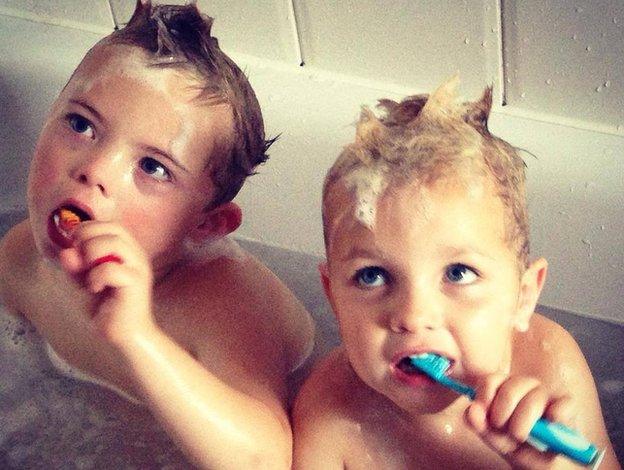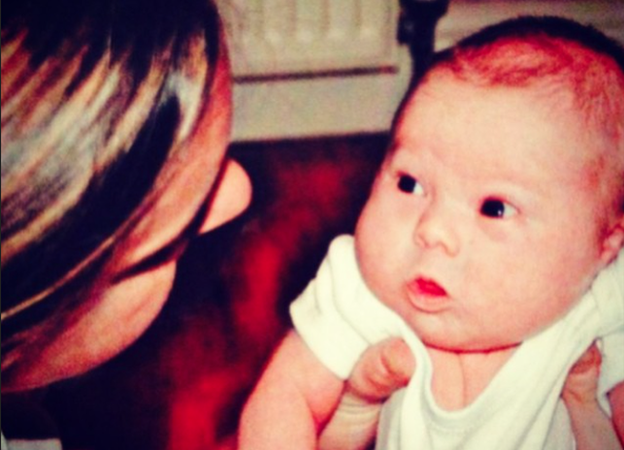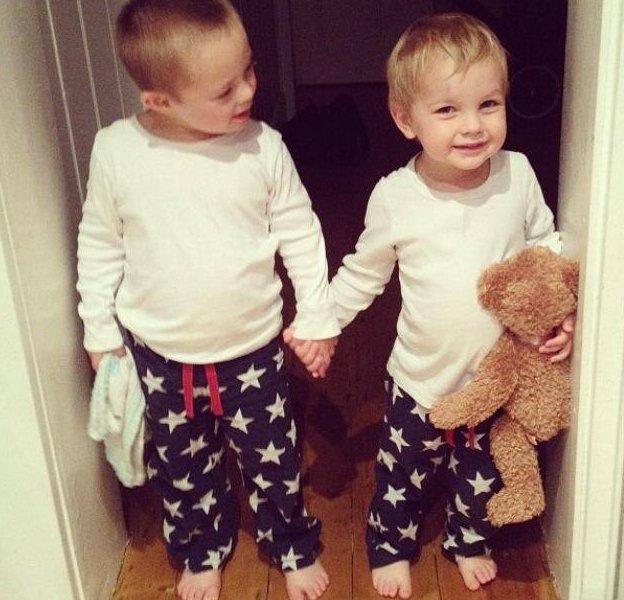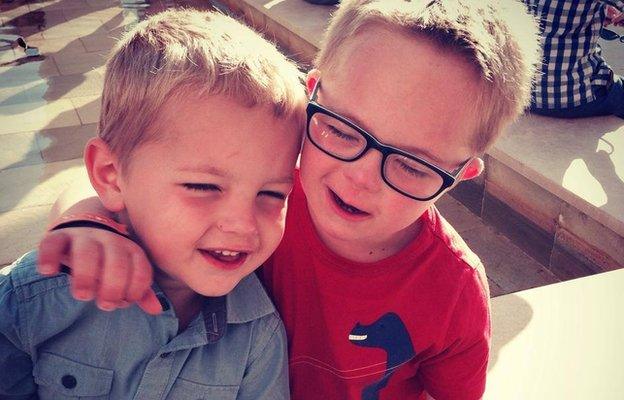Viewpoint: 'Children see a person not a disability'
- Published

Caroline White's son Seb has Down's syndrome. Here she explains why she wishes more adults would treat him the way children do.
If you were asked who or what it was that taught you the greatest lessons in your life your first answer would most likely be a particularly inspiring teacher, your time at university, a year spent travelling, a best friend, an influential adult, a beloved parent or grandparent.
All of these people and experiences have undoubtedly influenced my outlook on life and, without question, have all shaped who I am today.
My steepest learning curve of all has been in the last seven years. The birth of my first baby, with an added diagnosis of Down's syndrome, proved to be truly life-changing.
Within that experience I have learned so much - about me, about others, about priorities, and equality. But it is Seb himself, and the children around him, that have taught me the most.
My memories of being told my son had Down's syndrome, at just a day old, are very bleak. I was devastated. My mind raced with fear of what the future held for us and I imagined a lifetime of exclusion and disability, of being on the outskirts, being stared at and feeling "different".
For a time I thought the hurt would never lift. At that moment my baby didn't just have Down's syndrome, he was Down's syndrome. I pigeonholed him into a box of outdated stereotypes and failed to see that actually he was still a baby, and my baby. Seb.

Bit by bit the pain began to ease as I fell hopelessly in love with this little boy. With each day that passed he showed me something new about him. He grew from a beautiful baby to an adorable, but sometimes challenging, toddler and from there to an equally adorable (and equally challenging) little boy.
He now loves football and scooting, ice cream and chips but hates having his hair washed and going to bed. He is a little boy who has learned to read and write, who loves going to the cinema and playing with his mates. Our lives together could not be further from the bleak outlook I had imagined.
But still I find myself faced with pre-conceived assumptions made by well-meaning adults on a regular basis. People will tell me that "children like Seb" are loving and giving or they will say that Seb seems to have "it" mildly. And if I am telling someone for the first time that I have a son with Down's syndrome the most common response is "Oh!" and a palpable feeling of awkwardness, and on more than one occasion, followed with an "I'm sorry".
But with children it is different. There is a beautiful innocence through the eyes of a child. They see a person, not a syndrome.
Seb attends a mainstream school. The children at the school don't know that Seb has a "label". They have no pre-conceived ideas of what he should or shouldn't be, or what he can or cant do. He is just Seb. If asked to describe him, the other children would say how good he is on his scooter, that he loves football, that he is a fast runner or that he needs a little bit of extra help at school. If you asked the parents of those children the same question then I still think "Down's syndrome" would be in the first sentence.

Seb now has two younger siblings and I have never told them that he has Down's syndrome. I want them to grow up seeing Seb as Seb. I don't want him labelled or excused.
So it took me aback when Seb's four-year-old brother, out of nowhere, suddenly said to me: "Mummy, Seb talks funny doesn't he?"
I was unprepared for the question and had to think fast.
"Well, you know, some of us are good at some things, and some of us are good at others," I said, trying to buy myself some thinking time.
"You know how Seb is good at football, and you are good at talking? Well, we are all just different and good at different things"
"Oh yes!" he excitedly replied, "maybe he was talking in Spanish, Seb's good at Spanish!"
And that was it. Nothing else, nothing more. He accepted the explanation and moved on.

I wish so much when I had been given Seb's diagnosis that I could have seen the world through a child's eyes. The news would have made little impact, if any. I feel so sad that I wasted those precious early days wrapped up in my own unnecessary fear. The panic I encountered was, without a doubt, based on ignorance.
I grew up in an era when children (and adults) with a learning disability were rarely seen. I don't remember ever having the opportunity to talk to or get to know anyone disabled as a child. Children with learning difficulties, and disabilities in general, were not seen at school or at dancing or Brownies or on the football pitch or in the cinema.
In fact, "disabled" people were segregated into their own community and often the only time you saw anyone disabled was en masse at an outing to the seaside. This meant that I never got the chance to see beyond the label they were given and ultimately, when my son was given a diagnosis of Down's syndrome, I was uncomfortable with it and felt devastated. I feel really ashamed of that now.
Caroline White blogs about having a child with Down's syndrome here, external.
Follow @BBCOuch, external on Twitter and on Facebook, external, and listen to our monthly talk show